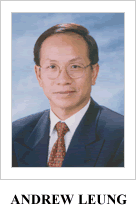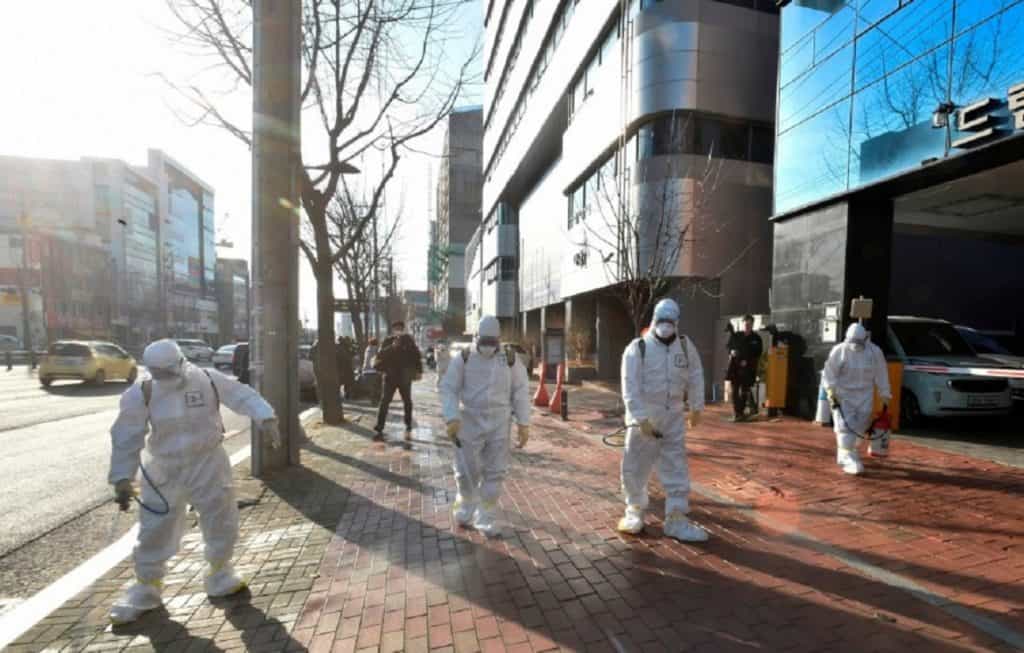By Andrew K.P. Leung (International and Independent China Strategist. Chairman and CEO, Andrew Leung International Consultants and Investments Limited)
 In the Wall Street Journal on April 3, Henry Kissinger opines that the Coronavirus pandemic will forever alter the World Order. According to him, the world will never be the same as the resultant political and economic upheaval could last for generations. (1) But what kind of a world is likely to ensue?
In the Wall Street Journal on April 3, Henry Kissinger opines that the Coronavirus pandemic will forever alter the World Order. According to him, the world will never be the same as the resultant political and economic upheaval could last for generations. (1) But what kind of a world is likely to ensue?
First, what horror stories we are witnessing across the globe are likely to be the tip of a gigantic iceberg. India’s sudden national lockdown begs the question whether its relatively few cases mask a hidden epidemic of untested and unverified proportions. The developing world in the Southern Hemisphere is unlikely to fare better. Africa, with a population of 1.3 billion, may well become the next epicenter. Changing seasons may ignite an explosion of cases down south, while the outbreak may well return to the Northern Hemisphere later in the year. Besides a horrendous death toll, the Coronavirus crisis may trigger a prolonged world recession as government “helicopter money” fails to turn the tide.
Second, the pandemic has accelerated the fracturing of American global leadership. America First has descended into a scramble for medical supplies in competition with allies. (2) This reaffirms the conviction that the United States has retreated from the global commons, its own national interests always trumping everyone else’s, including those of allies. Examples abound in how the Trump administration treats global issues like Climate Change, Iran, and Palestine. This reality comes at a time when China, albeit resurgent, remains unwilling and not yet qualified to take over America’s mantle of global leadership.
Third, China’s apparent success in overcoming the crisis serves only to intensity America’s epochal contest in shaping the 21st century, as highlighted by Evan Osnos in the New Yorker of 6 January, 2020. (3) Across the aisle, China is perceived as an existential threat to the America-led liberal world order, to be confronted at all costs (4). Some politicians are gunning for holding China accountable for the pandemic (5), perhaps by forgiving US debt (China’s trillion dollar holding of US treasuries) (6). Recent memories of US spreading the H1N1 virus worldwide in 2009-10 are conveniently forgotten, not to mention the loss of two precious months downplaying the virus’ risks after being formally notified by China in early January. Nevertheless, pride and prejudice are powerful blinders, as well as double standards driven by wide ideological and cultural divide. In the coming years, the United States is set to try even harder to push back against China, whosoever is in the Whitehouse. Confrontation is likely to be the new normal, without ruling out transactional cooperation where it suits the United States.
Fourth, warts and all, China’s model of governance has demonstrated its unique capabilities and brand of legitimacy, even if unattractive. Compared with Western democracies, China’s draconian national lockdown left no stone unturned. There was no attempt to place the economy ahead of human lives, no discrimination against the old and infirm. Regardless of accusations of initial cover-up and “medical diplomacy”, critical medical supplies and assistance are being delivered to some 82 countries worldwide (7). As China has become the largest trading partner to far more countries than the United States, many nations are hedging their bets, unwilling or unable to take sides. While American capacity to dictate weakens, some middling powers, US allies included, are flexing their muscles. A “No One’s World” is beckoning, as Charles Kupchan presaged in his 2012 eponymous book. (8)
Fifth, as multiple countries fight for survival, nationalism is rising across the globe. In face of collapsing medical systems, tear-jerking images of selfless frontline medical staff splash across TV and other media channels. Notwithstanding criticism and dissatisfaction, people stick with their governments in common belief that everyone is in it together. When the worst is over, many nations, China included, would feel more united and empowered to stand up to bullying by any foreign hegemon.
Sixth, countries suddenly realize how vulnerable they are to pandemics. Health security is now name of the game. While international cooperation is there, national self-sufficiency in “strategic medical supplies” becomes paramount, especially for nations embarrassingly caught off-guard. Following the US-China trade war, disruptions in China-centric supply chains are still taking their toll The threat of over-dependence on China is now gaining currency. There is popular perception that China should not be the only game in town.
Seventh, China’s national lockdown has accelerated the development of cutting-edge technologies such as big data, artificial intelligence, 5G, robotics and drones. These are widely used in diagnosis, hospital services, quarantine regimes, real-time consultations, neighborhood security, urgent deliveries and e-learning. These new technologies, all part of “Made in China 2025”, the nation’s wish-list for technological leapfrog, are set to sustain China’s long-term economic trajectory.
Eighth, the crisis has sparked ugly anti-Chinese sentiments in overseas communities. As many countries struggle in offering medical and health protection, many of China’s 600,000 overseas students have returned or are returning to home turf safety. Even before the crisis, barriers and access restrictions have been imposed on top-flight visiting Chinese scholars and researchers in the United States. Many are finding their future in the motherland. This trend is set to enrich and upgrade China’s long-term human capital.
Ninth, towards the end of a recent teleconference with European Union leaders, French President Emmanuel Macron warned that the pandemic is challenging the survival of the European project. Its brittleness has been under a series of existential threats including the global financial crisis, the Eurozone crisis, the refugee migration crisis, authoritarian regression of Hungary and Poland, and Brexit. The Coronavirus crisis could well be the last straw breaking the camel’s back, according to Heather Conley of the Center for Strategic and International Studies, Washington D.C. (9)
Tenth, on a more positive note, as the Coronavirus shows, the world is deeply inter-connected and inter-dependent. Global supply and value chains are intricately intermeshed. Complete bifurcation is almost impossible. Challenges like regional security, denuclearization, Climate Change, and Sustainable Development Goals, all demand global partnership and cooperation. The more so if an effective global pandemic-prevention and management infrastructure is to be achieved. Despite all the chaos and upheaval, perhaps there is some hope for a brave new world.
____________________________________________________________________________
1. The Coronavirus Pandemic Will Forever Alter the World Order, Henry Kissinger, Wall Street Journal, 3 April, 2020 https://www.wsj.com/articles/the-coronavirus-pandemic-will-forever-alter-the-world-order-11585953005(accessed on 6 April, 2020)
2. Germany accuses US of face mask piracy, Financial Times, 4 April, 2020 https://www.ft.com/content/bb52e108-a345-4278-8e72-f1c20e010cda(accessed on 6 April, 2020)
3. The Future of America’s Contest with China: Washington is in an intensifying standoff with Beijing. Which one will fundamentally shape the twenty-first century?, Evan Osnos, New Yorker, 6 January, 2020 https://www.newyorker.com/magazine/2020/01/13/the-future-of-americas-contest-with-china(accessed on 8 January, 2020)
4. Consider the Possibility That Trump Is Right About China, Nadia Schadlow, former US deputy national-security adviser for strategy, The Atlantic, 5 April, 2020 https://www.theatlantic.com/ideas/archive/2020/04/consider-possibility-trump-right-china/609493/(accessed on 6 April, 2020)
5. To Protect the Future, Hold China to Account, Lewis Libby and Logan Rank, National Review, 21 March, 2020 https://www.nationalreview.com/2020/03/coronavirus-pandemic-hold-china-accountable/(accessed on 6 April, 2020)
6, Republican congressman calls on Trump to make China forgive US debt over coronavirus crisis, Emma Cotton, Washington Examiner, 17 March, 2020 https://www.washingtonexaminer.com/news/republican-congressman-calls-on-trump-to-make-china-forgive-us-debt-over-coronavirus-crisis(accessed on 6 April, 2020)
7. MFA: China Has Announced Assistance to 82 Countries, WHO and African Union to Fight COVID-19, China’s Ministry of Foreign Affairs, 20 March, 2020 https://www.fmprc.gov.cn/mfa_eng/topics_665678/kjgzbdfyyq/t1759145.shtml(accessed on 8 April, 2020)
8. No One’s World: The West, The Rising Rest, and the Coming Global Turn, Charles A Kupchan, Oxford University Press, 2012
9. An Eroding European Union, Heather Conley, Centre for Strategic and International Studies. Washington D.C., 6 April, 2020 https://www.csis.org/analysis/eroding-european-union?utm_source=CSIS+All&utm_campaign=440c42b8b5-EMAIL_CAMPAIGN_2020_04_06_01_31&utm_medium=email&utm_term=0_f326fc46b6-440c42b8b5-222050389 (accessed on 9 April, 2020)
(The views expressed in this article belong only to the author and do not necessarily reflect the views of World Geostrategic Insights).
Image Credit: AFP/Daegu Metropolitan City Namgu







